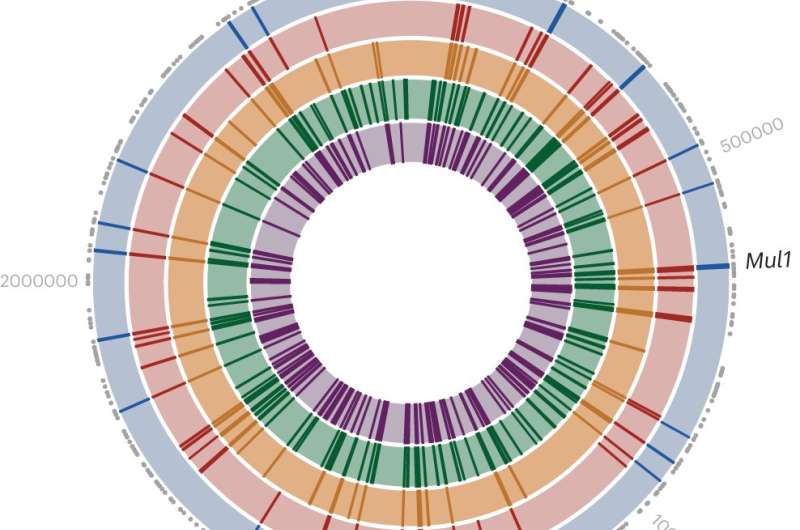June 22, 2023 report
This article has been reviewed according to Science X's editorial process and policies. Editors have highlighted the following attributes while ensuring the content's credibility:
fact-checked
peer-reviewed publication
trusted source
proofread
Akkermansia muciniphila found to regulate cholesterol biosynthesis in the gut

A study led by Duke University has looked into the operating mechanisms of Akkermansia muciniphila, a gut microbe associated with lower rates of metabolic disorders.
In the paper, "A genetic system for Akkermansia muciniphila reveals a role for mucin foraging in gut colonization and host sterol biosynthesis gene expression," published in Nature Microbiology, researchers developed and applied transposon mutagenesis to identify genes essential for intestinal colonization and the use of mucin.
A. muciniphila can make up as much as 3 to 5% of the biota found in stool. It is present in wild animals, and its abundance in humans seems critical for healthy physiological functions, as abnormal levels are associated with immune disorders, pregnancy complications, cancer, neurological disorders and every kind of metabolic disease.
For this reason, it is being considered a potential probiotic, but much about the mechanisms of A. muciniphila remains a mystery. Approximately 35% of its genome encodes proteins with no known or even predicted function.
Akkermansia proteins share few similarities with other prominent gut microbes, limiting activity comparisons. The researchers established methods for transposon mutagenesis, a way of altering small bits of genetic code to shut off activity selectively. By observing what disruptions occur, the researchers can get an idea of what genes code for which functions.
A. muciniphila is known to use mucins as its preferred nutrient source. Mucins are large, highly glycosylated proteins that comprise the bulk of the intestinal mucus lining. The study found that, despite having the capability to produce a wide range of glycoside hydrolase enzymes, estimated to be around 60, only a few are needed to degrade intestinal mucins. This redundancy means that even if there were a mutation in one or most of these genes, the organism would still have the ability to survive.
Mucin degradation products we observed to accumulate in internal compartments within the bacteria in a process that requires genes to encode pili and a periplasmic protein complex, which the team called mucin utilization locus (MUL) genes.
When implanted in mice without a complex microbiome, A. muciniphila accessed multiple nutrient sources in the gastrointestinal tract and did not use its MUL system the same way. In this germ-free scenario, MUL genes repressed human genes essential for cholesterol biosynthesis in the colon.
This suggests that using mucin as the preferred nutritional source is condition dependent, a strategy used when in a competitive microbiota environment, and that A. muciniphila can have multiple survival strategies.
The authors state that in addition to the beneficial immunomodulatory activities that have been assigned to A. muciniphila, "…the active catabolism of mucin by Akkermansia may provide additional health benefits by regulating the expression of genes involved in lipid biosynthesis."
More information: Lauren E. Davey et al, A genetic system for Akkermansia muciniphila reveals a role for mucin foraging in gut colonization and host sterol biosynthesis gene expression, Nature Microbiology (2023). DOI: 10.1038/s41564-023-01407-w
Research Highlight: A mucus-eating microbe controls the gut's cholesterol factory, Nature (2023). DOI: 10.1038/d41586-023-01944-8
Journal information: Nature Microbiology , Nature
© 2023 Science X Network





















